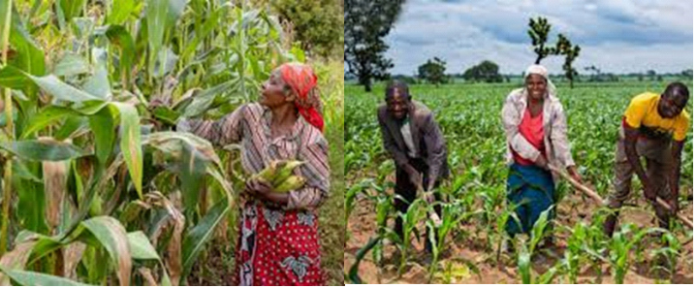TO say that there is hunger in the land is just an understatement. It is just saying the obvious and everybody is feeling it no matter how highly placed you are in the society, it is either it hits you directly or indirectly.
The government, individuals, groups, have been finding ways to fight the hunger and the general belief is that agriculture remains the best way to go. This is in terms of provision of food security, employment and stimulating economic growth.
According to reports, agriculture is the most important sector in the Nigerian economy and it employs 60 percent of Nigerians, including rural women and contributes up to 35 percent of the country’s Gross Domestic Product (GDP).
Generally, Delta State has tremendous potentials in agriculture and the Governor, Sheriff Oborevwori said from the beginning that his administration will pursue multiple strategies that would boost agricultural produce and encourage the free market for raw materials and food stuff.
He said, “I shall engage the youths in farming through a structured cluster farming alongside supporting and providing out growers association.
He also said that “there would be a structured relationship with the farming population with a view to enhancing production storage and marketing provision and improvement in transportation infrastructure in the rural areas to facilitate farm produce.
In like manner, recently the Delta State government has also underscored the pivotal role of agriculture in ensuring food security. The Commissioner for Agriculture and Mineral Resources, Mr. Val Areyenka in an inaugural meeting with key officials of his ministry, said that the state government’s vision for agriculture is to enhance food security, create jobs, contribute and stimulate economic growth and development. Mr. Areyenka stated that agriculture had long been marginalized leading to inadequate food supplies, rising food prices and high unemployment rate among youths. He also argued that if agricultural sector received as much investment as the oil sector, that Nigeria would achieve self sufficiency in food production.
The commissioner promised to actively contribute to the vision and assured Deltans of access to adequate and affordable food and proposed the adoption of an agricultural model for fish farming, suggesting a train the trainer approach to modernize local fish farming practices.
He noted that while agriculture is a significant endeavor it also offers a better solution for increasing fish production.
Then, he criticized the traditional approach providing monetary loans to farmers citing widespread misuse and abuse and instead, proposed that government should support on focusing and creating a conducive environment for farmers by way of supplying farming inputs and maintaining agricultural facilities.
He also suggested that abandoned agriculture facilities be repaired and made available to genuine farmers on a maintenance basis, arguing that government should not be involved in farming directly, while stressing on the need for back yard farming and how the practice helped to meet daily needs.
No doubt, Governor Sheriff Oborevwori and his Agriculture Commissioner have spoken well and given their vision and pathways for economic and agricultural growth in the state. One also recalls serious efforts made by previous administrations to ensure food security in the state.
The Songhai Delta comes to mind that produced more than 20,000 youth farmers and hosted several seminars and workshops that has helped to produce many farmers in the state and beyond. There was also the Agriculture Development Programme (ADP) which was launched in 1972, two years after the civil war when Nigeria was facing hunger. It was meant to increase food production and to raise the income of small scale farmers through capacity building. The ADP is and has been a laudable project and one wonders why it has not developed beyond the present state yet, it still remains one of the ways meant to fight food insecurity in the state and outside, long before now.
A prominent farmer, Mr. Gabriel Eke, said that such project and policies ought to be sustained and improved upon, adding that if the government had followed it up, that hunger of the present magnitude would not have faced the citizens of the state and country in general.
He said that there is food insecurity in the state and nation, is an indication that something is basically wrong somewhere because Nigeria as a nation has all it takes to be good and food secured. According to him, Nigeria has the arable land, the large population, and rich economy to fight food inflation and urged the government to look back at the drawing board because it is not yet late.
The farmer asked the government, farmers and other relevant stake holders to improve fertilizer use, conduct regular soil tests, use synegic inputs and employ extension persons in different fields in research Institutions.
He decried the low use of agriculture extension workers in the country and urged the ministries of agriculture to have a look with a view to reviewing the functions of agriculture extension workers in research institutions.
He also said that there is the need to listen to suggestions by agriculture experts and experienced workers in different fields of agriculture, adding that the solution to the food insecurity might come from there.
The Delta State Government is on the right path and present Agriculture Commissioner is in the right place and called on him to sustain the tempo as the citizens of the state and the nation at large continue to grapple with food insecurity. The fight for food insecurity and inflation goes on and it must be won if there will be peace in the society. As they say that a hungry man is an angry man.


